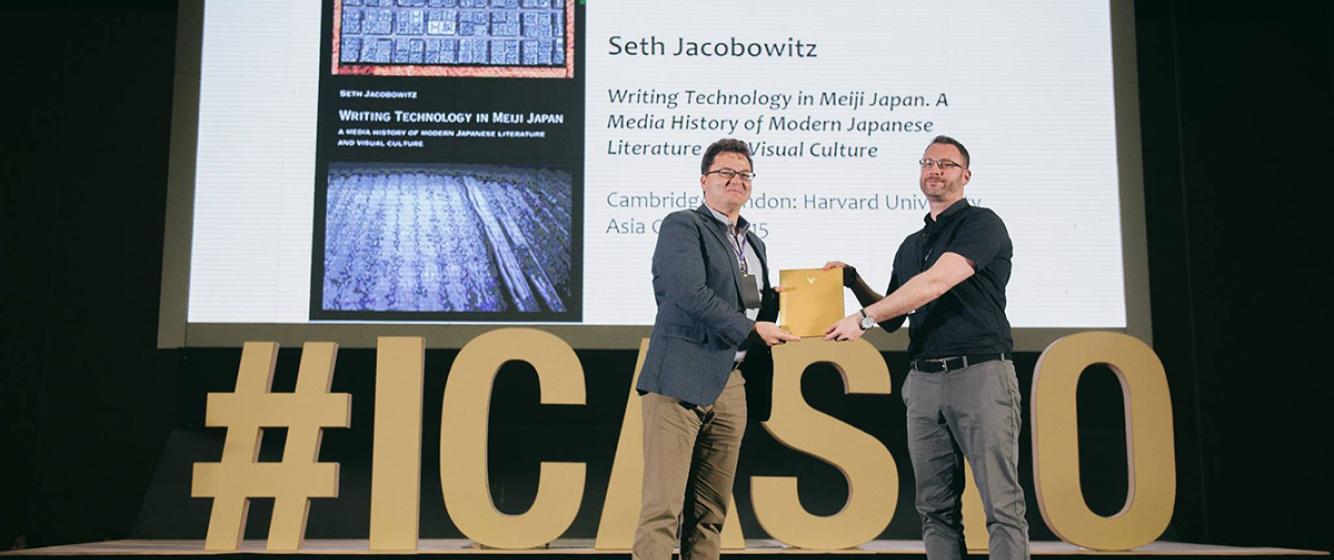
Shortlist, Winner and Accolades IBP 2017 Humanities
Winner of IBP 2017 Humanities
Seth Jacobowitz, Writing Technology in Meiji Japan. A Media History of Modern Japanese Literature and Visual Culture. Harvard University Asia Center, 2015.
Superbly written, Writing Technology in Meiji Japan deploys a sophisticated analytical prism to examine the interlocked transformations of literature, language, and visual culture during a historical epoch known for its increasing efforts towards standardisation. Meiji Japan is masterfully placed in conversation with the global appearance of new media technologies. The result is a highly original media history that rethinks and reconceptualises the emergence of modern Japanese literature and culture, thus making it the deserved winner of the IBP 2017 in the Humanities.
Reading Committee Accolades IBP 2017 Humanities
Shortlist IBP 2017 Humanities
David Arnold, Toxic Histories. Poison and Pollution in Modern India. Cambridge University Press, 2016.
Through the lens of poison and attendant ideas of pollution and toxicity, this book revisits the history of India during parts of the 19th and 20thcenturies. The outcome is an intoxicatingly original account that brings together the material and the ideological dimensions of poison, the local cultures around it, and the wide-ranging transformation brought about by the colonial regime in the arenas of pharmacology, chemistry and medical jurisprudence. Against this backdrop, Arnold offers a compelling narrative that skilfully navigates between colonisers and the colonised, royals and the poor, the rural and the urban, and last but not least, flora and fauna.
Christina Elizabeth Firpo, The Uprooted: Race, Children, and Imperialism in French Indochina, 1890-1980. University of Hawai’i Press, 2016.
The Uprooted tells the forgotten tale of a ‘stolen’ generation: the fatherless métis children born in French Indochina. Uprooted from their Southeast Asian mothers, these children were placed in government-run orphanages and educational institutions as part of a colonial policy devised to disconnect them from their maternal indigenous roots. Rich in archival detail, this thoroughly researched book offers a brilliant and thus far neglected instance of child removal and the associated colonial and post-colonial discourse of race and gender.
Rachel Leow, Taming Babel. Language in the Making of Malaysia. Cambridge University Press, 2016.
Taming Babel compellingly illustrates the importance of language in the making of diverse nation-states, focusing on Malaysia’s language attitudes in the long 20th century. The result is a captivating study of control and negotiation, imposed taxonomies, and agency from below. This creative monograph approaches Malaysia’s language policy as a disciplinary yet ultimately unsuccessful tool of ethnic management, offering a thoughtful critique of the anxieties surrounding plural linguistic ecosystems shared in equal measure by British colonialism and post-colonial nation-building.
Sarah Tiffin, Southeast Asia in Ruins. Art and Empire in the Early 19th Century. NUS Press, 2016.
This landmark publication describes and analyses British representations of Southeast Asia’s ruined monuments in the late-18th and early-19th century, a time imbued with expansionist aspirations and notions of civilisational hierarchies. Clearly written and drawing upon an underexplored visual repertoire, Southeast Asia in Ruins casts a refreshing light on the nexus between colonial ideology and landscape, demonstrating how the trope of British superiority was purposefully contrasted with an implied Southeast Asian degeneracy. Beautifully illustrated, this book unveils the agency and anxiety of an imperial imagery.